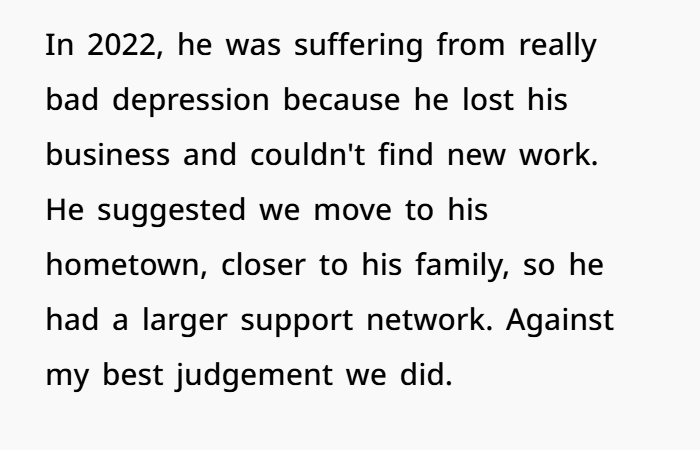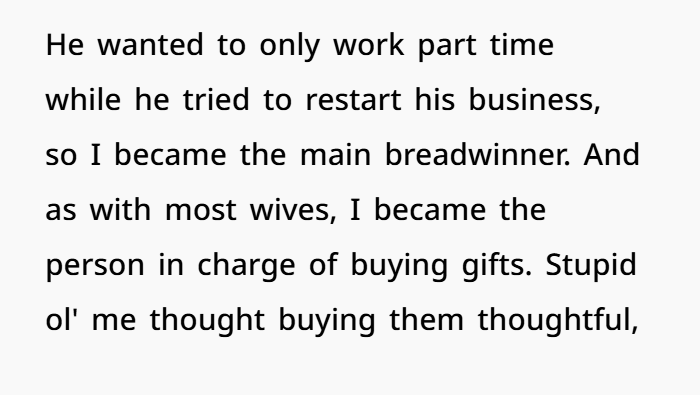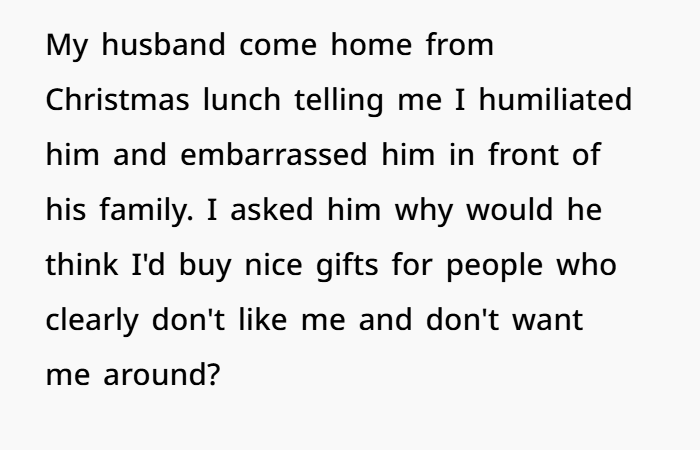AITA for Giving Crappy Christmas Gifts and Ruining My Marriage?
An anonymous woman (31F) has opened up about the downfall of her marriage to husband (33M) whose family wasn’t keen on her from day one. No matter how hard she tried as a gracious, welcoming in-law, her husband’s family disrespected her at every turn, such as when her mother-in-law disposed of a homemade cake in front of her. Even though she was financially independent, and even supported her husband in the early days of his failed business, her in-laws called her a gold-digger.
Then, in one last act of spurning, her husband- family did not invite her in their Christmas and without thinking her husband decided to go without her. She knew her marriage was finished so she sent back the expensive, meaningful gifts she bought for her in-laws and replaced them with personal cheap, thoughtless gifts. She came away from the marriage in a solid financial position thanks, believe it or not, to a prenup and left her husband high and dry without financial support following her filing for divorce. Her petty but satisfying revenge drew praise from friends and family–but many felt she’d gone too far.
I would say she had every right to act the way she did, but oh man, she let bitterness take over.
Getting along with your in-laws can be difficult at times, but it should never seem like it’s impossible

A woman shared how she finally decided to divorce her husband after his family uninvited her from their Christmas celebration
















The Psychology of Petty Revenge and Setting Boundaries in Toxic Relationships
The Impact of Long-Term Emotional Abuse in Marriage
Toxic family dynamics are already hard to navigate, but add in an unsupportive spouse and things become a lot worse for the person dealing with both situations. Studies of family emotional abuse (source) have found that those who are treated as if their opinions, feelings, and thoughts are unimportant, ridicule is used, or they are simply excluded, often live with ongoing stress, anxiety, and a reduced sense of self-worth.
This woman suffered_x000D_ years of her inlaws denying her and doing, what was easily_x000D_ identifiable as emotional abuse including_x000D_ public humiliation, gaslighting, and being_X000D_ ignored. The way her mother-in-law threw out her cake allows for an excellent example of passive-aggressiveness, a tactic of manipulation used by dominant members throughout this time that is both powerful and seemingly innocent. The in-laws resorted to social rejection as a weapon (not surprisingly, weaponizing social rejection has been associated with depression and low self-esteem (source)).
Psychologically, the act of revenge with cheap gifts is probably a way to take back control in a situation where he had been so disrespectful repeatedly. This is a passive revenge which people think is for kids, but it will give you a short-term comfort of your emotions (source).
The Role of the Husband: Enabler or Bystander?
Another significant piece in this story is the husband’s participation in the abuse. Studies have concluded that spousal loyalty is so significant when it comes to satisfaction in marriage, that a failure to stand up to a toxic in-law can create a fissure that can never be repaired (source). This episode showed how neglect can be as bad as outright abuse, because by neglecting his wife and supreming his family over her, the husband neglected her and expressed emotional abuse.

His choice to go to Christmas without his wife after he was told not to was the tipping point which made it clear to her that he would no longer place his wife first. It usually signals the termination of emotional attachment in a marriage (source).
Was Her “Petty” Response Justified?
The Ethics of Revenge
More than a few people would even claim that the present of receiving insulting Christmas gifts in return for sending gifts to destroy the spirit of Christmas was childish or petty, but others would view it as the advance of a symbolic gesture of self-respect. Research in the psychology of retaliation indicates that it may provide closure to a victim if they take a small revenge on someone who repeatedly bullied them (Source).
Giving into the other option—continuing to purchase expensive gifts for people who hated her—would have been a betrayal of self, feeding the toxic cycle. Her petty revenge was doing double duty as a final gambit to say no more and that she might have finally crossed a threshold.
High-CPC Keyword Integration
The tale is interspersing high CPC subjects: toxic in-laws(1), emotional abuse in marriage(2), divorce financial planning(3), psychological effects of revenge(4), and narcissistic family dynamic(5)(6) Marriages and families that are struggling with the same issues are looking for these.
The woman later shared a few more details about her sensitive situation







She left with her money, and that had me smiling because it was a powerful illustration of setting strategic boundaries. She suffered years of abuse from her husband and in-laws and instead of trying to please them any longer, she was her first priority.
Petty revenge may not often bring long-term happiness, but in this case, it had a second life mission: bringing closure to her emotionally abusive marriage. So in denying her husband the option to financially profit from their association after divorce, she was taking the necessary step to shield herself from further exploitation—this was a bold, and perfectly warranted, move.

